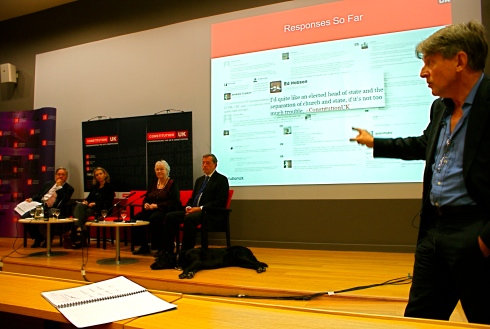R (PressBoF) v Culture Secretary: the press’s grounds for judicial review
Here’s the statement of facts and grounds – drafted by Richard Gordon QC and Sarah Love, both of Brick Court Chambers – in support of the Press Board of Finance’s judicial review claim in respect of the decision not to grant its own draft Royal Charter on press self-regulation.
The important piece of news contained in this document comes in paragraphs 108 and 109: PressBoF does want an injunction to prevent the government taking steps to have its Royal Charter approved by the Queen on Wednesday.
I’ll be making detailed comments on the legal to the legal arguments set out in these grounds over the next few days – but my initial reaction is underneath the viewer. Click on the bottom left of the viewer, if you want to see the document in fullscreen view.
PressBoFs argument is entirely about the process the government adopted before recommending rejection of its draft Charter.
It says it, PressBoF, was denied the right to be heard in relation to its own Charter because it was not told what criteria ministers would measure it against, was not told the essence of the “case against” its Charter, and was not given a chance to make representations; it claims ministers ran a flawed consultation exercise in which the public were invited to comment without knowledge of the criteria the government would apply – and in which PressBof itself was not consulted; and it complains (essentially for all the same reasons) that ministers breached PressBoF’s legitimate expectation that a fair procedure would be followed.
Typically in my experience, on first sight a judicial review claim backed by a well-funded applicant often appears strong. But once tested, they’re often weaker than they seem, and I think this claim too is weaker than a first look might suggest.
For once thing the three grounds are essentially repetitive: all PressBoF is really saying is that it didn’t know why ministers might think the press’s Charter unsatisfactory, and so was never given a fair chance to meet their concerns.
If you take a step back, though, that seems a tough argument to make given that Lord Justice Leveson’s recommendations were so widely reported, that the cross-party Charter had already been published, that the Chair of PressBoF Lord Black himself seems to have had at least three meetings in person with the Culture Secretary this summer, and that the government seems (see footnote 1 to the government’s letter setting out its reasons for rejection) to have received over a hundred sets of comments supporting the press Charter from editors and newspapers groups including the Telegraph, News International and the Daily Mail Group.
PressBoF will be a tough legal opponent for the government. Defending a judicial review against a well-funded and well lawyered-up commercial organisation is never easy. And one of the detailed points made in these grounds (see paragraph 81(b)), that the government said it would share with PressBoF its “criteria” for making a recommendation and then never did, is a slightly troubling one, and will I think be causing some worry among government lawyers.
But that’s the strongest point PressBoF has. PressBoF’s lawyers have undoubtedly done a good job of putting together these facts and grounds (Richard Gordon and Sarah Love appear to be instructed by DAC Beachcroft, by the way – Lord Hunt’s firm), but I don’t think their legal argument is strong, seen in the context of the government’s well-known aim of implementing Leveson. The government will I think successfully defend this challenge.


